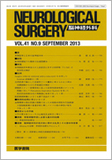Japanese
English
- 有料閲覧
- Abstract 文献概要
- 1ページ目 Look Inside
- 参考文献 Reference
Ⅰ.はじめに
本邦では,高齢者人口の増加に伴い,脳血管障害(脳内出血,脳梗塞を含む脳卒中)有病者は増加の一途を辿っている11).高齢者における,脳卒中など内科的全身疾患に伴う非特異的な症候としてせん妄があり,最も重要な老年症候群の1つとされている.脳卒中におけるその頻度は12~48%と報告され2,5,6,12),せん妄症状が起きると,単に精神的症状というだけでなく,治療に対する患者の協力が得られなくなり,リハビリテーションを含むすべての治療の障害となる.
脳卒中入院後に起きる,せん妄症状に使用される薬剤としては,ハロペリドール,リスペリドン,オランザピン,クエチアピンなどがあるが,2005年に米国FDA(Food and Drug Administration)から,非定型抗精神病薬が認知症患者の死亡率を高めるとの勧告が出された22).以後,同様の報告が相次ぎ4,17),これらの薬剤は原則的に使用が困難となってきている.
抑肝散(TJ-54)は従来,神経症や不眠症に対して用いられてきたが,近年,認知症周辺症状であるbehavioral and psychological symptoms of dementia(BPSD)に改善効果があると報告されている7).その後,精神科,神経内科領域では抑肝散(TJ-54)の有効性が相次いで報告されているが,急性期脳卒中の領域では報告が少ない8).
今回われわれは,脳卒中を発症して緊急入院後にせん妄症状が出現した患者に対する抑肝散(TJ-54)の効果と安全性について後ろ向きに調査した.
The aim of our retrospective study was to investigate the efficacy and safety of Yokukansan(TJ-54)in treating delirium during hospitalization following acute stroke.
We retrospectively analyzed the patients 1)who were admitted to our single stroke center from January 2010 to December 2011 due to acute stroke within four days from onset, 2)who presented with delirium after admission, which was diagnosed according to the Diagnostic and Statistical Manual of Mental Disorders-Ⅳ-Text Revision(DSM-Ⅳ-TR)criteria, and 3)who received 2.5g of Yokukansan(TJ-54)three times a day for treating delirium and which was continued until discharge or until onset of adverse effects. We investigated the patient's baseline characteristics, the period of Yokukansan treatment, history of using of another psychotropic drug and complications. We used the Delirium Rating Scale(DRS)to assess delirium state before and at five days after initiation of Yokukansan(TJ-54).
We analyzed 77 patients retrospectively. Their mean age was 79.3 years old, and 48 patients(62%)were female. Median DRS score was improved from 15(interquartile range;14-18)to 8(interquartile;6-13), statistically significant(p<0.01)at five days after the initiation of Yokukansan(TJ-54). The median period of Yokukansan(TJ-54)treatment was seven days. There were no patients who received psychotropic drugs or who were suspected of developing oversedation due to Yokukansan(TJ-54).
In our study, delirium symptoms following acute stroke improved after Yokukansan(TJ-54)treatment. A randomized controlled trial is needed to establish the effectiveness of Yokukansan(TJ-54)in delirium after stroke.

Copyright © 2013, Igaku-Shoin Ltd. All rights reserved.


